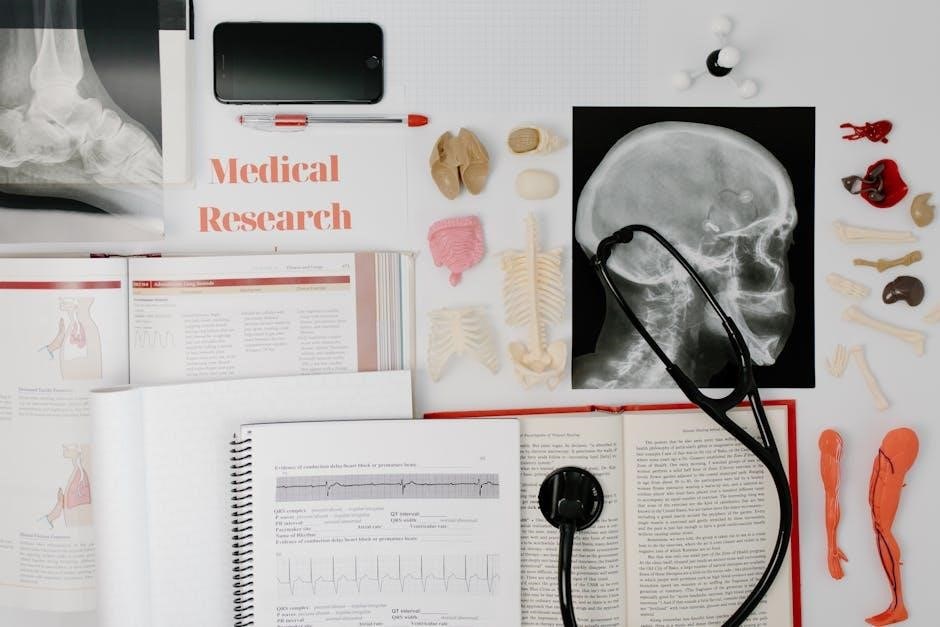The Science Bowl is a challenging quiz competition covering life science‚ physical science‚ Earth-space science‚ and math. Students can prepare using sample questions from past competitions‚ focusing on key topics and short-answer formats to enhance their knowledge and teamwork skills. Regular practice with these resources ensures a strong performance in the event.
Overview of the Science Bowl Competition
The Science Bowl is a prestigious academic competition organized for middle and high school students‚ testing their knowledge in science and math. Teams of 4-5 students compete‚ answering challenging questions in multiple formats‚ including multiple-choice‚ short-answer‚ and toss-up rounds. The competition is divided into regional and national levels‚ with the DOE National Science Bowl being the most prominent. Questions cover life science‚ physical science‚ Earth-space science‚ and math‚ requiring quick thinking and deep understanding. Teams prepare extensively using official DOE materials‚ online archives‚ and practice packets. The competition fosters teamwork‚ critical thinking‚ and problem-solving skills‚ making it a cornerstone of STEM education for students. Regular practice with sample questions is essential for success.
Importance of Practicing with Sample Questions
Practicing with sample questions is crucial for excelling in the Science Bowl. These questions mirror the competition format‚ helping students familiarize themselves with the types of queries they will face. Regular practice improves knowledge retention‚ enhances quick thinking‚ and identifies areas needing further study. Teams can use practice packets and online archives to simulate real competition scenarios‚ building confidence and strategic thinking. Timing sessions with sample questions also helps students manage their time effectively during the actual event. Additionally‚ flashcards and short-answer drills can reinforce key concepts‚ ensuring a strong foundation in science and math. Consistent practice not only boosts individual performance but also strengthens team collaboration‚ essential for Science Bowl success.
Key Categories of Science Bowl Questions
The Science Bowl features questions in four main categories: Life Science‚ Physical Science‚ Earth and Space Science‚ and Math. Each category tests depth and breadth of knowledge.
Life Science Questions
Life Science questions focus on biology‚ ecology‚ and health topics. Students are tested on processes like photosynthesis‚ cell structures‚ and ecosystems. Many questions emphasize understanding biological concepts and their applications. Sample questions often include short answers‚ such as identifying metabolic pathways or explaining species interactions. Multiple-choice options also appear‚ covering topics like genetics or human anatomy. These questions require a strong foundation in scientific terminology and the ability to analyze biological systems. Teams can prepare using official DOE materials and practice packets‚ which include past competition questions. Mastery of life science questions is crucial for overall success in the Science Bowl‚ as they make up a significant portion of the competition. Regular practice helps build confidence and accuracy.
Physical Science Questions
Physical Science questions cover physics‚ chemistry‚ and their applications. Topics include motion‚ energy‚ forces‚ and chemical reactions. Multiple-choice and short-answer questions test understanding of scientific principles and problem-solving skills. For example‚ questions might ask about the velocity of an object or the principles of the Compton effect. Students must apply mathematical concepts to solve equations and interpret data. Practice materials‚ such as DOE resources and past competition packets‚ provide ample opportunities to master these areas. Regular review of physical science questions helps build confidence and accuracy‚ essential for success in the Science Bowl. These questions require a strong grasp of fundamental concepts and the ability to think critically under time constraints.
Earth and Space Science Questions
Earth and Space Science questions explore topics like planets‚ stars‚ plate tectonics‚ and weather patterns. Students are tested on their understanding of Earth’s systems‚ climate change‚ and natural resources. Sample questions might ask about the water cycle or the formation of mountain ranges. Multiple-choice and short-answer formats require knowledge of geological processes and astronomical phenomena. These questions also cover human impacts on the environment and Earth’s history. To excel‚ students should study diagrams‚ maps‚ and current events related to Earth and space science. Regular practice with sample questions helps build familiarity with the subject matter and improves critical thinking skills. This category is essential for a well-rounded Science Bowl preparation.

Math and Short Answer Questions
Math and short answer questions test problem-solving skills and the ability to think critically under time pressure. These questions often involve algebra‚ geometry‚ and word problems‚ requiring students to show their calculations. Short answers demand concise yet complete responses‚ ensuring accuracy and clarity. Teams must practice mental math and quick writing to excel. Timing sessions help simulate real competition conditions‚ building stamina and focus. Reviewing past questions can identify common problem types and improve response strategies. Strong performance in this category depends on both individual mastery and effective teamwork. Regular practice with sample questions is essential to refine skills and boost confidence for the competition.
Where to Find Middle School Science Bowl Resources
Third-party study guides and apps provide additional practice materials. Websites like the Quizbowl Packet Archive offer free access to past competition questions and study tools.
Official DOE National Science Bowl Materials
The U.S. Department of Energy (DOE) provides official resources for middle school teams‚ including a comprehensive datastore with over 7‚600 questions from past competitions. These materials are organized by category‚ such as life science‚ physical science‚ and math‚ and include both multiple-choice and short-answer formats. The DOE website offers free access to these practice questions‚ allowing students to familiarize themselves with the competition’s format and content. Regularly updated‚ these resources reflect the latest advancements in science and math‚ ensuring relevant and challenging preparation. Coaches and students can use these materials to identify areas for improvement and strengthen their team’s performance. This official support makes the DOE materials an essential tool for successful Science Bowl preparation.

Online Archives and Practice Packets
Online archives and practice packets are invaluable resources for preparing for the Science Bowl. Websites like the Middle School Quiz Bowl Packet Archive offer free access to past competition questions‚ organized by subject and difficulty. These materials include life science‚ physical science‚ Earth-space science‚ and math questions‚ providing a broad range of topics for study. Many archives feature questions from regional and national competitions‚ ensuring diverse and challenging content. Teams can use these packets to simulate real competitions during practice sessions‚ while individuals can focus on specific areas of weakness. Regularly updated archives ensure that students stay current with the latest science advancements. Exploring these resources is a key step in building a strong foundation for competition success.
Third-Party Study Guides and Apps
Third-party study guides and apps provide additional resources for Science Bowl preparation. These tools often include practice questions‚ flashcards‚ and interactive quizzes tailored to middle school competition topics. Apps like Quiz Bowl and Science Bowl Prep offer mobile-friendly platforms for on-the-go studying. Study guides from publishers specialize in breaking down complex concepts into digestible formats‚ focusing on life science‚ physical science‚ and math. Many apps feature timed practice sessions and score tracking to simulate competition conditions. These resources complement official materials by offering fresh question sets and innovative learning methods. They are particularly useful for students seeking additional challenges or alternative ways to reinforce their understanding of key subjects. Leveraging these tools can enhance both individual and team preparation strategies effectively.

How to Practice Effectively
Effective preparation combines individual and team efforts. Start with individual study using flashcards to memorize key terms and concepts. Gradually incorporate team practices to simulate competition dynamics‚ focusing on communication and quick decision-making. Utilize timed sessions to acclimate to competition pressure‚ enhancing speed and accuracy. Balance individual and team practice‚ setting goals and tracking progress to ensure everyone improves. Use diverse resources like official DOE materials and third-party guides for varied question formats. Regularly review and learn from mistakes‚ seeking feedback to refine strategies. This structured approach supports thorough preparation and strong performance in the Middle School Science Bowl.
Studying Individually vs. Team Practice
Balancing individual and team practice is crucial for success in the Middle School Science Bowl. Individual study allows students to focus on their weaknesses‚ delve into specific topics‚ and build foundational knowledge at their own pace. Tools like flashcards and online resources help reinforce concepts independently. In contrast‚ team practice simulates competition dynamics‚ fostering communication and quick decision-making. Teams learn to pool their knowledge‚ divide tasks‚ and strategize under time constraints. While individual study strengthens personal understanding‚ team practice hones collaboration and adaptability. A combination of both approaches ensures well-rounded preparation and enhances problem-solving skills. Regularly alternating between individual and team sessions helps maintain a balanced and effective study routine.

Using Flashcards for Quick Revision
Flashcards are an effective tool for quick revision in preparing for the Middle School Science Bowl. They allow students to focus on key terms‚ concepts‚ and formulas across various subjects. By writing questions on one side and answers on the other‚ flashcards enable rapid recall of information. Regular use helps reinforce memory and identify areas needing more attention. Digital flashcard apps also offer convenience and accessibility. Teams can create shared decks to review together‚ ensuring consistency in preparation. Flashcards are particularly useful for last-minute reviews before competitions‚ helping students feel confident and well-prepared. They complement other study methods‚ making them a valuable addition to any Science Bowl study routine. Regular practice with flashcards enhances retention and improves performance.

Timing Sessions to Simulate Real Competitions
Timing sessions are crucial for preparing students to manage their time effectively during the Science Bowl. By simulating real competition conditions‚ teams can practice answering questions within the allotted time‚ fostering quick thinking and decision-making. These sessions help students build confidence and reduce stress‚ allowing them to focus on the content rather than the clock. Timing practices also enable teams to refine their strategies for allocating time to different question types‚ such as short answers or multiple-choice questions. Regular timed sessions ensure that students are well-prepared for the fast-paced nature of the competition‚ helping them perform at their best when it matters most. This approach enhances overall readiness and teamwork.

Tips for Success in the Science Bowl
Understanding the question format and managing time effectively are key strategies for success. Practice with sample questions to build confidence and improve decision-making under pressure.
Understanding the Question Format
Familiarizing oneself with the question format is crucial for success in the Science Bowl. Questions often include multiple-choice options‚ short answers‚ and toss-up rounds. Multiple-choice questions require quick identification of correct answers‚ while short-answer questions demand precise and concise responses. Teams should practice both formats to improve accuracy and speed. Additionally‚ understanding the structure of toss-up and bonus rounds helps in strategizing effectively. Regular review of sample questions and past competitions can enhance a team’s ability to recognize patterns and anticipate question types. This preparation ensures that participants are well-equipped to handle the variety of challenges presented during the competition. Effective communication and quick thinking are also essential for maximizing scores.
Managing Time During the Competition
Time management is a critical factor in the Science Bowl‚ as teams must answer questions quickly and accurately. Multiple-choice questions often require rapid decisions‚ while short-answer questions demand careful thought. Teams should allocate time strategically‚ ensuring they address each question thoroughly without wasting precious seconds. Practicing under timed conditions helps build speed and accuracy. During the competition‚ staying calm and communicating clearly within the team is essential to avoid errors. Effective time management also involves prioritizing high-confidence answers and moving swiftly through the question set. By mastering this skill‚ teams can maximize their scores and maintain a competitive edge throughout the event. Proper time allocation is key to achieving success in the fast-paced environment of the Science Bowl.
Strategies for Multiple Choice and Short Answer Questions
Mastering strategies for multiple choice and short answer questions is essential for Science Bowl success. For multiple choice‚ eliminate incorrect options first‚ then select the most plausible answer. Pay attention to common distractors and wording nuances. For short answers‚ focus on clarity and conciseness‚ ensuring responses match the required format. Practice under timed conditions to improve speed and accuracy. Reviewing past questions helps identify recurring themes and question patterns. Teams should also discuss strategies for dividing responsibilities during the competition. Mnemonics and mental shortcuts can aid in recalling complex concepts quickly. Regular practice with both question types builds confidence and sharpens problem-solving skills‚ enabling teams to perform at their best during the event.
